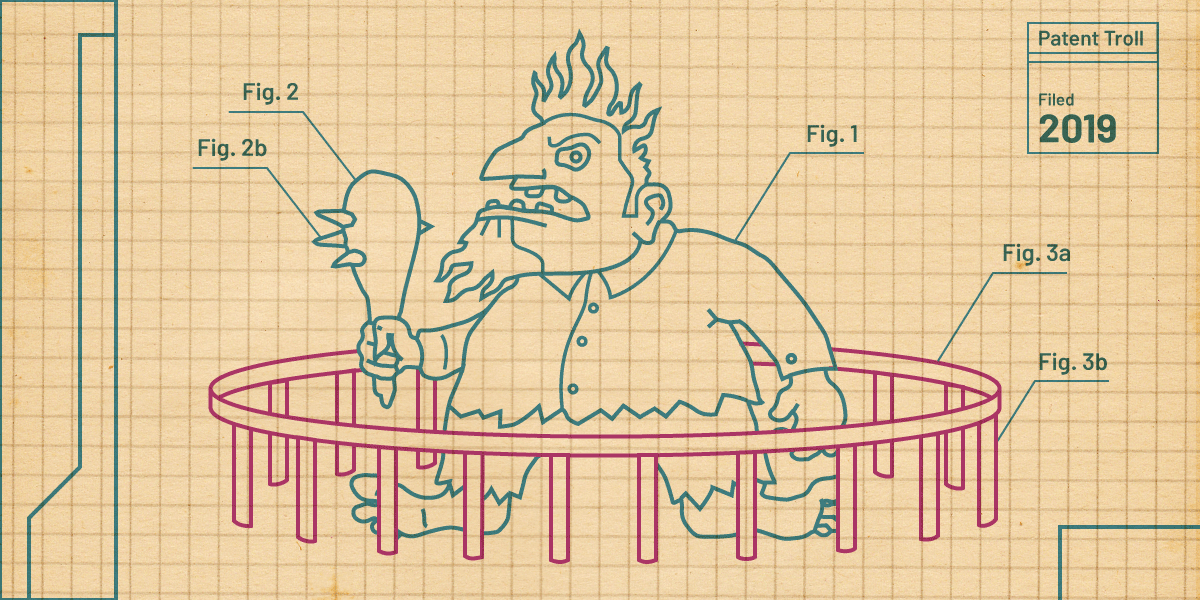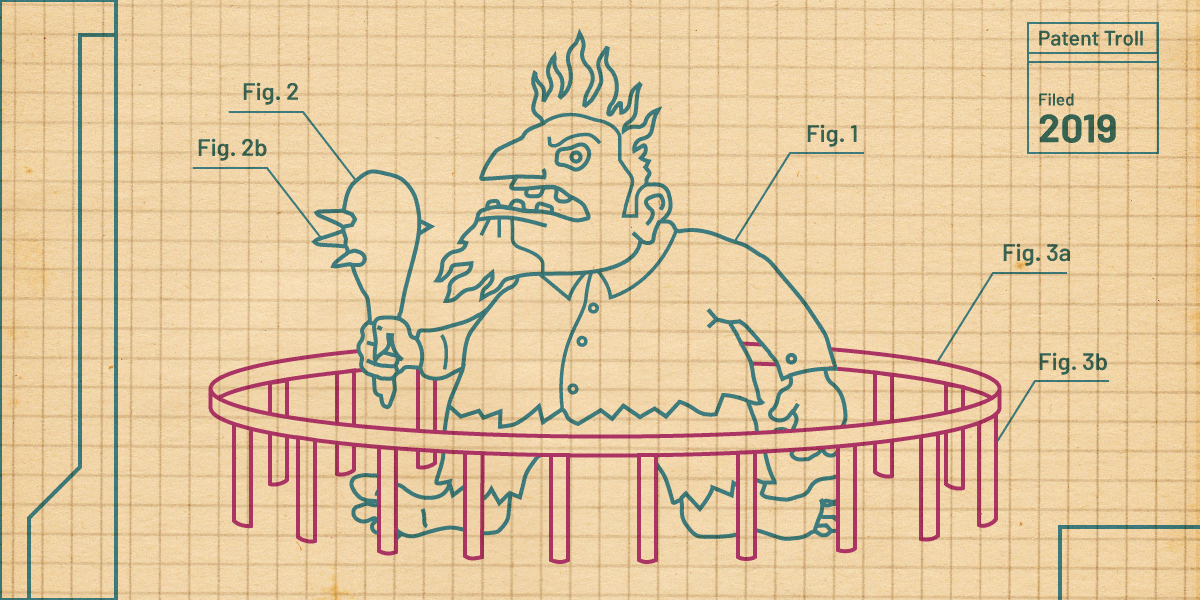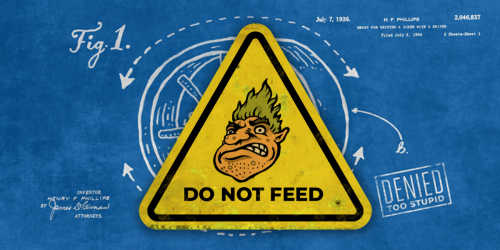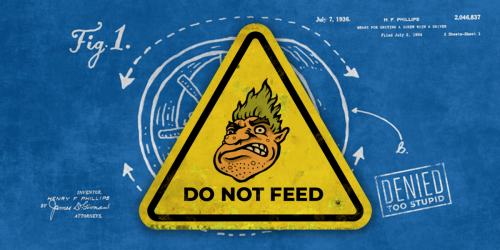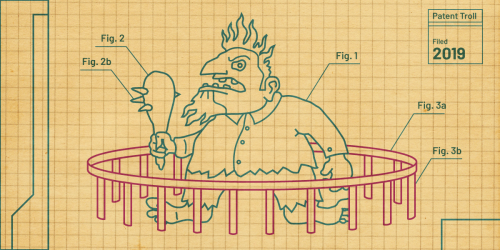All too often, software patents stop more innovation than they promote. Patents are legal instruments that can be used to sue people and companies for creating, selling, or using software. Very often, the entities wielding software patents are “patent trolls”—companies that make money off suing and threatening to sue others instead of building or doing anything of their own.
We’ve been advocating against problematic patents, particularly in software, for many years. In the past few years, it’s fair to say that patent trolls have been down—but not out. Two big changes that happened several years ago have made it realistic, finally, to get bad patents kicked out of the system. The first is the creation of the inter partes review system, in 2012; and next, the Supreme Court’s Alice v. CLS Bank decision, in 2014.
Unfortunately, 2019 has shown us that we need to keep working to protect the patent system. Congress and the U.S. Patent Office have been working remarkably hard to roll back these positive changes, and make life easier for patent trolls. At the same time, the Federal Circuit has been eroding the effect of Alice in decisions like last year’s in HP v. Berkheimer and this year’s Garmin v. Cellspin.
At the beginning of the year, USPTO Director Andre Iancu promulgated new guidance for patent examiners that essentially allows them to blow off the clear guidelines of the Alice decision. What that meant, in practice, is that examiners are being told to issue more of the worst type of software patents—ones that simply take abstract ideas, and make them sound like an “invention” by adding generic computer language. That means more patents coming out that will be fodder for patent trolls.
At EFF, we encouraged people to let the Patent Office know that the new guidelines were a bad idea. While we weren’t able to stop the new guidelines from taking effect, our supporters sent more than 1,500 comments to the Patent Office—sending a strong message that everyday users of technology are finally watching a government office that, all too often, is left in a state of total industry capture.
In Congress
In the U.S. Senate, leaders of a newly reconstituted IP Subcommittee have pushed forward two ideas that threaten to bring back the bad old days of peak patent trolling. The first attempt to empower patent trolls is a year-long effort to undermine Section 101 of the patent laws. That’s the section that bans patents on abstract ideas, natural phenomenon, and laws of nature. It’s the area of law that the Supreme Court properly interpreted in the Alice case, and in recent years, has allowed courts to throw hundreds of junk patents out of the system.
Senators Thom Tillis (R-N.C.) and Chris Coons (D-Del.) have insisted that Section 101 has stopped good inventions from getting patents. That’s not true. Many of the parties asking Congress to alter Section 101 are flat-out patent trolling entities, who don’t invent any technology themselves—they’re simply good at manipulating the patent system and threatening lawsuits. Others are large incumbent companies with massive patent portfolios, like GlaxoSmithKline, Qualcomm, and IBM. These companies simply want more monopolies on areas of emerging technology, like artificial intelligence and personalized medicine.
At EFF, we spoke out against this misguided effort, and EFF Staff Attorney Alex Moss testified in front of Congress. In the end, no bill to damage Section 101 has yet been introduced. That’s a testament to the advocacy of EFF and our many allies on this issue. But we’ll have to stay vigilant on this front, since there’s no doubt the same groups, seeking to wring more money from the patent system, will be back again in 2020. Fortunately, we’re able to work together with a huge range of allies—not just tech companies that want a balanced patent system, but also health care providers, labor unions, and consumer organizations.
Another perennial bad idea that returned in 2019 was the Stronger Patents Act, which would do a great job of strengthening patent trolls but offers nothing to true innovators. The Stronger Patents Act would have essentially wrecked inter partes review, or IPR, which is one of the most effective ways of challenging patents. We’re glad to report this bill went nowhere, and hope we don’t see it again.
In the Courts
Patent trolls continue to seek unjustified payments from companies of all sorts, many of them small firms that can’t afford the million-dollar legal bills that would come with a patent trial. Just one example: a patent troll called Inventergy sued a family-owned GPS tracking company, along with several other GPS firms. Inventergy backed off once we sent a letter explaining the problems with its patent, and EasyTracGPS has become one of the firms that was Saved by Alice.
Another great example is Ruth Taylor, who was sued over her website that organized online photography contests. We helped Ruth win her patent case back in 2015. This year, we published a video interview with Ruth talking about her experience, facing down a patent troll’s demand for $50,000 over her hobby website.
EFF scored a big win for transparency in the patent system when we intervened in a lawsuit filed by Uniloc, one of the most litigious patent trolls of all time, in court. Uniloc has sued dozens of technology companies, but at the same time has kept much of its most important pleadings redacted. But when Uniloc sued Apple, documents emerged that seemed to indicate Uniloc may not have rights to the patent it was asserting, because it had split the rights with a murky patent investment fund. EFF intervened to demand that the redacted documents be published, so that the public can understand the nature of Uniloc’s far-ranging allegations.
In May, Uniloc definitively lost this attempt to hide its machinations and shell games from the public. Uniloc has chosen to appeal this case to the Federal Circuit, where we’ll defend the public’s First Amendment right of access to the courts.
Finally, 2019 saw a major win for patents and free speech. In New Hampshire, a patent troll called Automated Transactions, LLC sued more than a dozen people and a trade group claiming it was defamed—simply because these groups had described it as a “patent troll.” EFF filed an amicus brief arguing this term can’t be defamatory. The New Hampshire Supreme Court agreed, finding that calling someone a “patent troll” is a statement of protected opinion, not fact.
In 2020, with our supporters’ help, we’ll continue to litigate, and advocate, for a fairer and more balanced patent system. And, when we need to, we’ll call a troll a troll—and you can, too.
This article is part of our Year in Review series. Read other articles about the fight for digital rights in 2019.
LIKE WHAT YOU'RE READING? SUPPORT DIGITAL FREEDOM DEFENSE TODAY!


